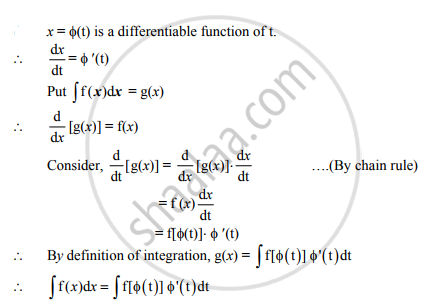Advertisements
Advertisements
प्रश्न
If x = Φ(t) differentiable function of ‘ t ' then prove that `int f(x) dx=intf[phi(t)]phi'(t)dt`
उत्तर

APPEARS IN
संबंधित प्रश्न
Find the particular solution of the differential equation `e^xsqrt(1-y^2)dx+y/xdy=0` , given that y=1 when x=0
Verify that the given function (explicit or implicit) is a solution of the corresponding differential equation:
y = ex + 1 : y″ – y′ = 0
Verify that the given function (explicit or implicit) is a solution of the corresponding differential equation:
y = cos x + C : y′ + sin x = 0
Verify that the given function (explicit or implicit) is a solution of the corresponding differential equation:
y = Ax : xy′ = y (x ≠ 0)
Verify that the given function (explicit or implicit) is a solution of the corresponding differential equation:
y = x sin x : xy' = `y + x sqrt (x^2 - y^2)` (x ≠ 0 and x > y or x < -y)
Verify that the given function (explicit or implicit) is a solution of the corresponding differential equation:
xy = log y + C : `y' = (y^2)/(1 - xy) (xy != 1)`
Verify that the given function (explicit or implicit) is a solution of the corresponding differential equation:
`y = sqrt(a^2 - x^2 ) x in (-a,a) : x + y dy/dx = 0(y != 0)`
The number of arbitrary constants in the general solution of a differential equation of fourth order are ______.
Solve the differential equation `[e^(-2sqrtx)/sqrtx - y/sqrtx] dx/dy = 1 (x != 0).`
Find a particular solution of the differential equation `dy/dx + y cot x = 4xcosec x(x != 0)`, given that y = 0 when `x = pi/2.`
The solution of the differential equation \[\frac{dy}{dx} = 1 + x + y^2 + x y^2 , y\left( 0 \right) = 0\] is
Solution of the differential equation \[\frac{dy}{dx} + \frac{y}{x}=\sin x\] is
The solution of the differential equation \[\frac{dy}{dx} - ky = 0, y\left( 0 \right) = 1\] approaches to zero when x → ∞, if
The number of arbitrary constants in the general solution of differential equation of fourth order is
The number of arbitrary constants in the particular solution of a differential equation of third order is
The solution of the differential equation \[\frac{dy}{dx} = \frac{y}{x} + \frac{\phi\left( \frac{y}{x} \right)}{\phi'\left( \frac{y}{x} \right)}\] is
\[\frac{dy}{dx} = \frac{y\left( x - y \right)}{x\left( x + y \right)}\]
`x cos x(dy)/(dx)+y(x sin x + cos x)=1`
Solve the following differential equation:- \[\left( x - y \right)\frac{dy}{dx} = x + 2y\]
Solve the following differential equation:- \[x \cos\left( \frac{y}{x} \right)\frac{dy}{dx} = y \cos\left( \frac{y}{x} \right) + x\]
Solve the following differential equation:- `y dx + x log (y)/(x)dy-2x dy=0`
Solve the following differential equation:-
\[x \log x\frac{dy}{dx} + y = \frac{2}{x}\log x\]
Solve the following differential equation:-
(1 + x2) dy + 2xy dx = cot x dx
Find a particular solution of the following differential equation:- (x + y) dy + (x − y) dx = 0; y = 1 when x = 1
Find the equation of a curve passing through the point (−2, 3), given that the slope of the tangent to the curve at any point (x, y) is `(2x)/y^2.`
Solve the differential equation: `(d"y")/(d"x") - (2"x")/(1+"x"^2) "y" = "x"^2 + 2`
Solution of the differential equation `"dx"/x + "dy"/y` = 0 is ______.
Find the general solution of y2dx + (x2 – xy + y2) dy = 0.
Find the general solution of (1 + tany)(dx – dy) + 2xdy = 0.
Find the general solution of `("d"y)/("d"x) -3y = sin2x`
The differential equation for y = Acos αx + Bsin αx, where A and B are arbitrary constants is ______.
y = aemx+ be–mx satisfies which of the following differential equation?
The general solution of the differential equation (ex + 1) ydy = (y + 1) exdx is ______.
The solution of `("d"y)/("d"x) = (y/x)^(1/3)` is `y^(2/3) - x^(2/3)` = c.
Find a particular solution satisfying the given condition `- cos((dy)/(dx)) = a, (a ∈ R), y` = 1 when `x` = 0
Find the general solution of the differential equation `x (dy)/(dx) = y(logy - logx + 1)`.
Find the general solution of the differential equation:
`log((dy)/(dx)) = ax + by`.
